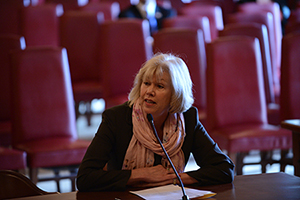 Over the past week, I read the Tribune’s stories about the astonishing failures at DCFS’s residential treatment centers, and each day I become more troubled.
Over the past week, I read the Tribune’s stories about the astonishing failures at DCFS’s residential treatment centers, and each day I become more troubled.
Last year, after the Tribune and other news sources reported on the disturbing number of children who die in DCFS custody, I launched a series of hearings about the problems at the state agency charged with protecting abused and neglected children. We found that the agency has problems that run from its director to its hourly workers, and we started taking steps to address them, passing several laws that should help protect children who may be victims of abuse.
Nothing we heard came close to the horror stories coming out of the agency’s residential centers recently reported by the Tribune.
What is even more appalling is that even after months of hearings last year, neither the agency nor the service providers once mention these egregious problems at residential treatment centers. I don’t know which is worse – the idea that the agency was covering these facts up or the idea that its top administrators didn’t even know what was happening.
Sadly, I suspect that the latter is true. DCFS has seen a revolving door of directors – some openly corrupt and others clearly not up to the challenge of turning this vitally important agency around. I hope that Governor-elect Rauner will change that, and I look forward to working with him to restore sanity to Illinois’ child welfare process. He spoke of the importance of DCFS during the recent campaign, which I see as an encouraging sign.
I also think we must revisit the DCFS budget, even in these times of fiscal austerity. Funding issues are not the agency’s only problem – but there’s no question that they are a problem. I’m sickened when I read stories of the cash-strapped agency squandering its meager resources, and I’m hopeful that a competent administrator will be able to end the waste and fraud that have too often slipped through the cracks at DCFS. But there’s no question the agency needs more workers and the resources to hire highly trained workers with the emotional stability to take on one of the toughest jobs in the world.
The agency also needs policy changes, and some of the laws we passed last year should help. But there’s clearly much more work to do. We’re already planning a hearing of the Illinois Senate’s Human Services and Appropriations Committees, and I plan to reconvene my DCFS-specific subcommittee to get to the bottom of these problems.
I’m not new to working with DCFS – I was on the agency’s Advisory Council from 1986 to 1994, and I was recently reappointed to it. I’ve done what I can to start turning the situation at DCFS around, but clearly we need to move faster. I hope one of Mr. Rauner’s first acts as governor is to appoint a new, experienced, highly qualified director at DCFS who will work with the legislature and be honest with the public about what we need to do to make DCFS what it is meant to be: a bastion of safety for abandoned and abused children.




